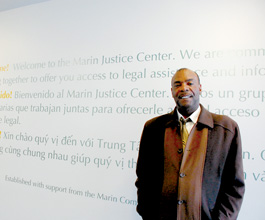home | north bay bohemian index | news | north bay | news article

Photograph by Alma Shaw ON THE LEVEL: Grassroots Leadership Network's John Young: 'It says a lot about what everybody knows,' he says of the report.
County Fair?
HUD accuses Marin County of violating federal anti-discrimination laws
By Leilani Clark
Though one of the wealthiest counties in the nation, Marin County is on the hot seat when it comes to promoting and providing access to affordable housing for minorities and people with disabilities. A recent review by the U.S. Department of Housing and Urban Development (HUD) concludes that the county has failed to comply with the 1964 Civil Rights Act and two other anti-discrimination statutes in its use and spending of federal grants and funds. If the issues aren't fixed, millions of dollars in HUD grants and funding could be withheld from Marin.
The county has since entered into a voluntary compliance agreement with HUD and commissioned a document from Fair Housing Marin titled "Analysis of Impediments to Fair Housing Choice" (AI). The barriers to fair housing listed in the report include strict zoning ordinances and restrictions on development of high-density, multi-family housing; negative stereotypes about Section 8 voucher holders; predatory lending practices; and insufficient outreach to those for whom English is a second language.
Response from the community has been varied, with many residents sharing frustration over the complicated nature of the issue. John Young, executive director of the Grassroots Leadership Network of Marin, explains that his organization has two major concerns about how the document was developed. First, he says, "protected groups"—the actual minority and disabled populations addressed in the report—were not allowed to give insight into the findings.
"It says a lot about what everybody knows, but it doesn't really say how those things can be resolved or corrected," Young says. He also claims that the report doesn't address the ultimate underlying factor in the lack of diversity in Marin: racism.
"How can you prepare an analysis of impediments as to why there is a low proportion of minority people in this county, and skirt around the very reason why?" Young says.
According to Nancy Kenyon, executive director of Fair Housing Marin, race has played a part in many of the housing discrimination cases investigated by her organization in a county that, according to 2010 census figures, is 80 percent white. In one situation, Fair Housing Marin received a call from a white mobile home owner in Marin County who wanted to sell his home to a Mexican family. When the manager told him that they "wouldn't take Mexicans in the complex," the homeowner filed a complaint. Fair Housing Marin investigated, sued the mobile home park and won.
In spite of instances like this, Kenyon argues that Marin's track record on affordable housing is decent, including predominantly white areas like Corte Madera and Tiburon. Yet the county was also cited for inadequately updating and tracking ethnicity statistics, making it difficult to come into compliance with HUD regulations. The fact that the only family public housing in the county is located in Marin City, already the highest-density minority area in the county, is also problematic, according to the AI.
"I hope that some of the changes that we recommended in the report come to fruition," says Kenyon. "They will require money, and that's going to be tough, and it might bring up opposition to the goals."
But Chuck Hauptman, regional director of the Office of Fair Housing and Equal Opportunity at the San Francisco HUD headquarters, says that Marin County has been cooperative and has already made positive steps towards remedying the situation. "The county has been great. They jumped onto the AI," says Hauptman. "At some point, they will analyze the information that is required. And then decide what action they want to focus on."
Marin County Community Development Agency coordinator Roy Bateman has been collecting public comments on the AI, and is working to bring the county into alignment with the voluntary compliance agreement. Bateman says that the real question has become: "Where do you find the real Marin?"
"Even at the upper end of the income spectrum, Marin has not been successful in attracting minority populations," says Bateman. "Is it just that we have such a small minority population that people who have a choice would prefer to be somewhere where they won't be the first people in the area that look like them? And how do you get past that as a community?"
The Marin County Board of Supervisors holds a public hearing on the 'Analysis of Impediments' on Tuesday, May 10, during their regularly scheduled meeting. Call 415.499.6779 after May 6 for specific details and times.
|
|
|
|
|
|